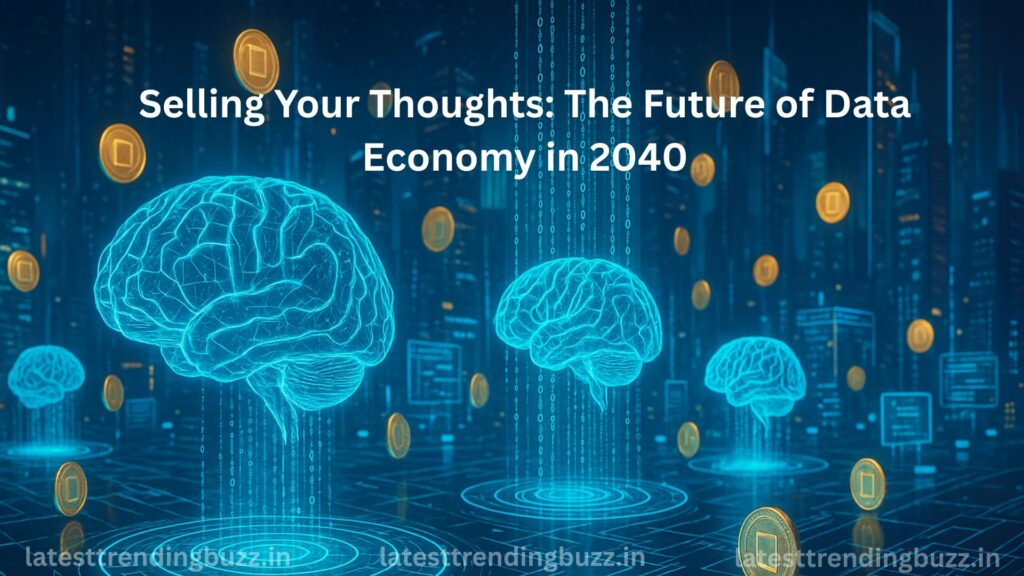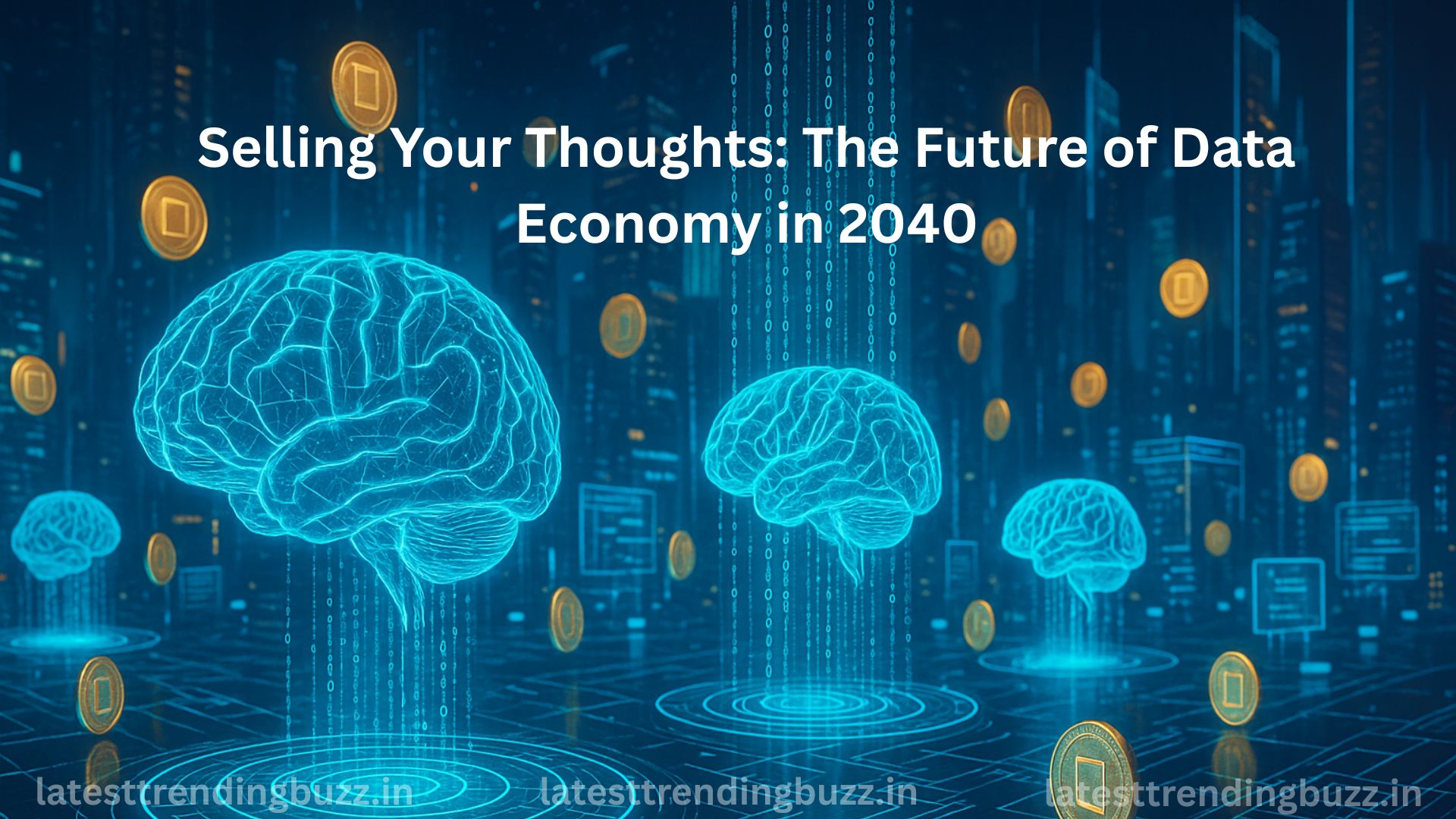What if your ideas had a price tag?
What if, in the near future, you could literally sell your thoughts for money?
Welcome to 2040 — a world where data is no longer just what you click or type, but what you think. The rise of neuro-AI and brain-computer interfaces is pushing humanity into a radical new age — Selling Your Thoughts.
It’s not science fiction anymore. Tech companies, researchers, and digital ethicists are all asking the same question: if thoughts can be recorded, analyzed, and tokenized — who owns them?
From Social Data to Mind Data
In the early 2020s, we traded privacy for convenience. Our clicks, searches, and messages became the fuel for the internet economy. But by 2040, that economy evolves into something even more intimate — Selling Your Thoughts.
Thanks to advancements in neural sensors and AI, companies can now interpret electrical brain signals to understand ideas, emotions, and decisions before they’re expressed.
What used to be “user-generated content” becomes “thought-generated content.” Every idea in your head could become a tradable commodity.
How Selling Your Thoughts Works
The concept of Selling Your Thoughts revolves around mind-data marketplaces — platforms powered by blockchain and neuro-AI.
Here’s how it might work in 2040:
- Neural Wallets: Your brain interface connects to a secure “neuro wallet.”
- Thought Capture: You decide what ideas or memories to share.
- Encryption: AI converts neural patterns into digital assets (NFTs or mind-tokens).
- Marketplace Listing: Those thought assets are uploaded to a “Thought Exchange.”
- Buyers & Bidders: Companies, creators, and AI systems purchase your ideas to train algorithms or create art.
Essentially, you’d be able to sell imagination itself.
The Technology Behind It
When it comes to Selling Your Thoughts, several key technologies converge:
- Neuralink-style Brain Implants: Directly capture brain activity and transform it into code.
- Quantum Computing: Processes thought-data at enormous speed and scale.
- Blockchain: Ensures ownership, transparency, and traceability of mental data.
- AI Creativity Engines: Convert purchased thoughts into designs, products, or even movies.
This means creativity becomes literal currency. Your brain — once the most private space — becomes a living bank.
The Thought Economy: How Ideas Become Money
In the thought market, value depends on originality, clarity, and emotional impact.
Imagine this:
- A marketing company buys your daydream about a vacation spot to create an ad.
- A music label buys your melody ideas stored as brain patterns.
- A researcher buys your memory of fear to train emotion-recognition AI.
This is Selling Your Thoughts at scale — an entire economy driven by raw imagination.
Also Read: When AI Becomes Your Therapist Can Machines Heal Human Minds?
Thought Tokens and Mind NFTs
To make Selling Your Thoughts work securely, thoughts would likely be tokenized — just like cryptocurrency.
Each recorded thought becomes a unique mind NFT — a non-fungible mental object you can trade or license.
You could:
- Lease ideas to companies for temporary use.
- Auction original concepts (like song lyrics or startup ideas).
- Invest in others’ thoughts to share future profit rights.
It’s not just digital ownership — it’s mental ownership.
Who Owns the Mind?
If Selling Your Thoughts becomes common, one major question arises — who truly owns your ideas?
Right now, your data belongs partly to the platforms you use. But when data comes directly from your brain, the ethical stakes skyrocket.
- Can employers demand access to employee thought-data for productivity?
- Will governments regulate what thoughts can be traded?
- What if someone hacks your memories or downloads your emotions?
Philosophers call this cognitive capitalism — the moment when even human consciousness becomes a product.
India’s Role in the Thought Market
India, with its booming AI and data-tech sector, could become a leader in Selling Your Thoughts.
Imagine an Indian “Brainchain” startup offering decentralized mind-trading services, or IITs developing affordable neural wearables for creative industries.
Given India’s creative economy and massive population, the potential for exporting ideas — literally — could be world-changing.
The next billion-dollar unicorn may not build software; it might build mindware.

The Ethical and Emotional Cost
Every revolution has its dark side.
With Selling Your Thoughts, the human mind itself becomes a corporate battlefield. Big Tech could buy emotional data to predict behavior or manipulate decisions before they happen.
Even relationships might change — imagine a world where your partner can “access” your feelings in real time.
In 2040, privacy isn’t about hiding your search history — it’s about protecting your consciousness.
The Power of Consent
To make Selling Your Thoughts ethical, consent must become biometric and blockchain-verified.
Users should have full control over what they share and how it’s used. Governments will likely mandate “neuro-rights” — legal protections for mental autonomy, already discussed in Chile and parts of the EU.
Without this, the mind market risks turning into digital slavery — where people unknowingly sell their deepest selves for convenience or cash.
Will Creativity Become Capitalism’s Final Frontier?
There’s an irony here: Selling Your Thoughts turns creativity — once the most human thing — into the ultimate economic product.
In the 20th century, we sold time.
In the 21st, we sold data.
By 2040, we’ll sell thoughts.
It’s both inspiring and terrifying — a world where ideas have liquidity but imagination has a price.
Also Read: The Next Internet Revolution: When Your DNA Becomes Your Password
The Bright Side: Empowerment Through Mind Ownership
If done ethically, Selling Your Thoughts could also be the greatest equalizer.
Imagine artists, writers, and thinkers getting paid directly for inspiration. Imagine students earning income by sharing innovative research ideas with AI systems.
Instead of data exploitation, we could see data liberation — where every thought has value and ownership returns to the thinker.
The key is transparency and decentralized control — so your mind, your rules.
The 2040 Vision
In 2040, mental commerce will feel normal. Devices will read thoughts as easily as smartphones capture photos. AI will buy, sell, and remix human imagination.
When Selling Your Thoughts becomes mainstream, we’ll look back at social media and wonder how primitive it was to give away our ideas for free.
In this future, the richest people won’t own land or code — they’ll own minds.
FAQs
Q1. What does Selling Your Thoughts actually mean?
It means turning human brain activity — ideas, emotions, creativity — into tradable digital data.
Q2. Is Selling Your Thoughts scientifically possible?
Yes, brain-computer interface research by Neuralink and MIT shows early success in decoding brain signals into words or images.
Q3. Will this make privacy obsolete?
If not regulated, yes — but neuro-rights could protect mental privacy.
Q4. Can India lead the thought economy?
Absolutely. With growing AI startups and digital literacy, India could pioneer ethical thought trading platforms.
Q5. Is Selling Your Thoughts safe?
Only if thoughts are encrypted and ownership stays with the individual, not corporations.
Disclaimer
This article, Selling Your Thoughts, is for educational and informational purposes only. It explores a speculative technological concept for 2040 and does not endorse or predict any ongoing data-trading practices. Always follow ethical and legal data privacy standards.














